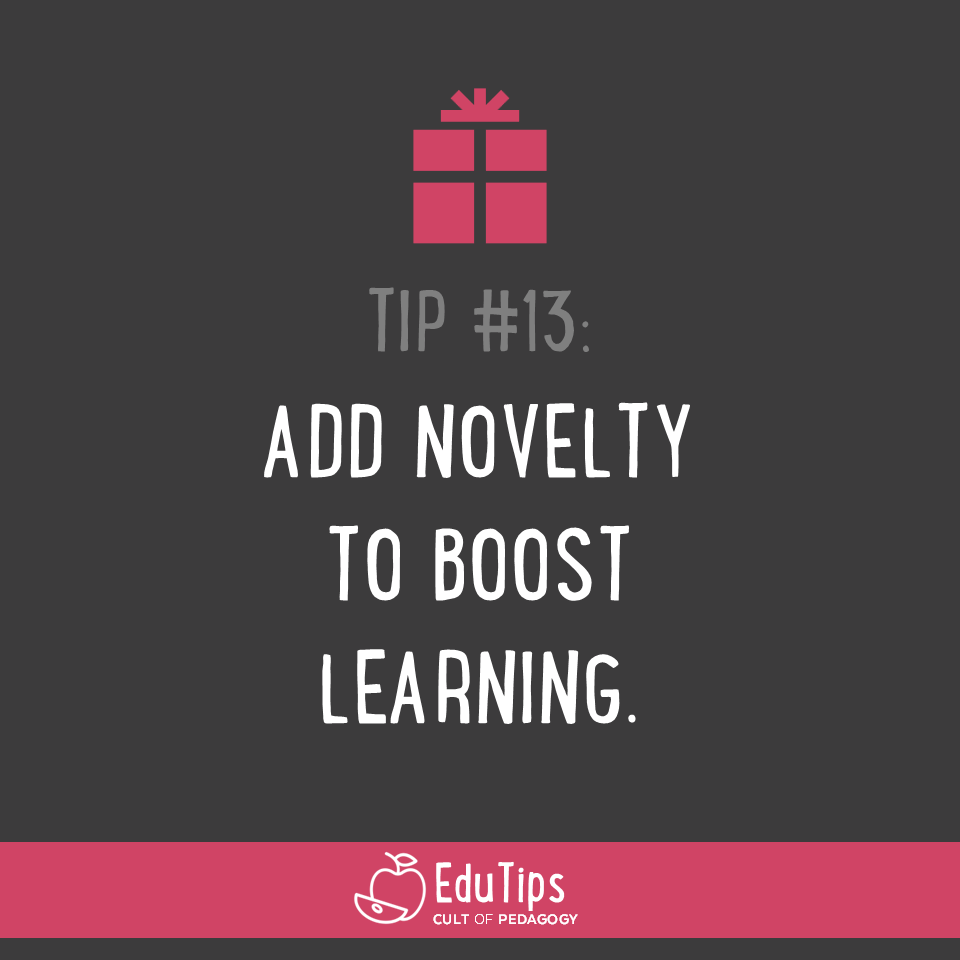Sponsored by PearDeck.

Watch a video version of this EduTip on Instagram.
There’s a scene in the movie Dead Poets Society—if you’ve never seen it, just know that it’s a classic teaching movie and you absolutely should—where Robin Williams’ character Mr. Keating has his students line up on a soccer field and take turns reciting lines from Walt Whitman’s poem A Song of Joys. It’s one of many times in the movie when Keating does something in the classroom that might be written off as mere eccentricity, like standing on desks or tearing pages out of books. But looking at it from a pedagogical standpoint, what he’s doing is using novelty as an instructional device, and it’s backed by solid research. Any time you add some kind of novelty to a learning experience—some new or different ingredient than what’s expected—you are making it more likely that your students will remember the thing they were supposed to learn from that lesson, even if the novel ingredient has nothing to do with the learning target.
Here’s a simple explanation of how this works in the brain: The hippocampus is the part of your brain responsible for learning and memory. When you encounter some kind of novel stimulus, dopamine is released in the hippocampus, which helps make that part of the brain more “plastic” and ready to form new synapses (see list of references at the end).
So this is just another thing you can add to your bag of tricks if it isn’t there already. If you want to boost learning in a lesson, add a little bit of novelty to make it memorable.
Here are a couple of ways you can change things up to add novelty…
- Location: Stand in a different part of your classroom, on top of a chair, have students come out to the hallway, hold a lesson in the cafeteria, out on the playground, under a tree. Change the lighting in your classroom. Move all the desks to the perimeter.
- Messenger: Have a student deliver part of your lesson, invite a guest speaker in, ask another teacher to join your class for a brief demonstration, or put students into pairs or groups for part of the lesson (while this isn’t all that novel an idea, the experience of working on a lesson with a peer can still offer more novelty than all teacher-directed instruction).
- Music: Play a particular piece of music throughout a lesson or in the background. If you can connect the lyrics to the lesson, even better.
- Movement: Invent gestures to go along with concepts or vocabulary words from the lesson and have students do the gesture regularly.
- Costumes: Show up with a weird hat, an unusual pair of glasses, or attention-getting shoes on the day when you’ll be teaching a particular topic.
- Stories: Tell an interesting, embarrassing, sad, or funny story to tie into the lesson.
- Food: Bring some kind of snack—think everyone finds a single goldfish cracker on their desk—that might somehow connect to the lesson.
If you’re doing this right, you should see the novel thing working to jar students’ memories. You might hear students say something like, “Oh yeah, that was the thing you taught us that one day when we sat in the hall,” or “Wait that was when Ms. Thomsen came in and read that thing to us!” They’ll make these little connections and be just a little bit better at pulling the stuff they learned out of long-term memory.
Research on Novelty and Learning
Fenker, D., & Schütze, H. (2008, December 17). Learning By Surprise. Scientific American. https://www.scientificamerican.com/article/learning-by-surprise/
Hicklin, T. (2016, September 20). How novelty boosts memory retention. National Institutes of Health (NIH). https://www.nih.gov/news-events/nih-research-matters/how-novelty-boosts-memory-retention
Hitti, M. (2006, August 2). Novelty May Boost Memory, Learning. WebMD. https://www.webmd.com/brain/news/20060802/novelty-may-boost-memory-learning
VIB (the Flanders Institute for Biotechnology). (2020, February 5). Novelty speeds up learning thanks to dopamine activation. ScienceDaily. https://www.sciencedaily.com/releases/2020/02/200205132255.htm
See all EduTips here.

Shared per emailed conversation with Debbie…
Hi Debbie,
Reflecting a bit on Jennifer’s 5 min quick tips.
One thing I experienced as a middle school teacher was done by our then principal, Bobby Rainey (retired, maybe deceased, I have lost contact.)
We were on a six week grading cycle, and what he would do is make the classes rotate every cycle. This meant that 1st period became second, second period became third, and so on, with 7th period becoming 1st period.
As a fairly new teacher, I was amazed at the difference this had on the entire school, and myself. I discovered that the “awful” seventh period class was a pretty good, and respectful first period class. After doing this for a year, I realized that at 7th period, both the kids and myself were getting close to our limits, and knowing that put everything into perspective. It also meant that the seventh period students weren’t “stuck” with a bad teacher all year…we all did a lot better after a rotation, and I believe I also became a better teacher for the next rotation’s seventh period.
Not sure if a lot of schools are doing this, and it was challenging for the guidance counselors working with kids on a IEP pullout, but overall, it was a great learning technique that really worked.
Mark